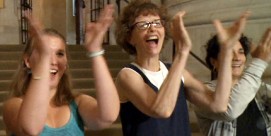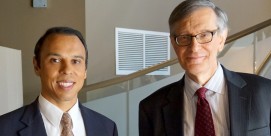In This Episode << SLIDE LEFT TO SEE ADDITIONAL SEGMENTS
Faith, Politics, and the National Cathedral
DEBORAH POTTER, guest host: One year after an earthquake caused substantial damage to the Washington National Cathedral, masons have made the first major repair to the central tower. A newly carved stone was put in place as the Cathedral announced a new gift of $5 million from the Lilly Endowment to help pay for restorations. The Cathedral has already spent most of the $2.8 million raised after the quake on stabilizing the structure. Total damage was estimated at $20 million. Joining us now is the interim dean at the Washington National Cathedral, Frank Wade. Thanks for coming.
REVEREND FRANK WADE (Interim Dean, Washington National Cathedral): Thank you.
POTTER: Twenty million dollars to repair a building is a lot of money. Is it worth it? Is there a real value to having cathedrals in the 21st century?
WADE: Cathedrals are part of where our culture restores its spiritual values and its sense of mystery. That’s really important. We need places like that, and the Washington National Cathedral plays that role in a peculiar way, in a particular way on the national scene—a great church for national purposes. So I think it’s very, very important. We would lose a great deal if we had no place to turn at key moments in our life when we want to remember God, remember mystery in the larger context of life.
POTTER: The Cathedral has always been a place where dialogue happens, and most recently, you’ve opened up the pages of your magazine to a dialogue, or at least a Q and A with the two presidential candidates about their faith. Why was that important?
WADE: It’s important because there’s no—while we separate church and state, there is no separation of faith and state. Faith is how you figure out life. It’s how you set priorities. The faith of our leaders is a very, very important part of the conversation. It’s how they will approach their job. So it’s a legitimate part of what goes on.
POTTER: And yet some people say it has no place in the election campaign, and we shouldn’t really talk about it, and the candidates don’t talk about it very much.
WADE: No, they don’t. But it’s emotionally laden. Faith is—it carries a lot of emotion with it. We’ve done wonderful things in the name of faith. We’ve done terrible things in the name of faith. It’s a very uncontrolled emotion in a culture, in a society. So people are nervous about it, but that doesn’t make it less important. Indeed, it makes it more important that we talk about it, ground it in understanding.
POTTER: You’ve said that both of these candidates come with assets from their faith backgrounds and liabilities. Can you talk more about what you mean?
WADE: Well, every faith background, every denomination, every Christian journey, every faith journey has limits, things that it does or does not do. You know, Governor Romney and President Obama both have grown up and formed their faith in different ways, certainly, but formed their faith in marginalized churches in our society, and so that constitutes a limit on the worldview that you get in that place. Now these are very broad strokes and very, you know, very generalized things. Both of these people from those churches have felt a call to serve this nation and the other and the world in wonderful, wonderful ways. But their faith communities have within them an intense inner loyalty that comes to a marginalized church, and that’s somewhat of a limitation. It obviously has not limited these two people.
POTTER: Why do you think so many Americans have sort of confused or uncertain feelings about the faith of these two candidates? You have some evangelicals saying Mormonism, the Church of Jesus Christ of Latter-day Saints, is not actually Christian. And you have a large percentage now, it’s actually a growing percentage, of people who say that well President Obama is a Muslim.
WADE: I think that—I don’t know why people do that. It’s difficult to talk and think about the faith of other people and because the African American tradition of President Obama and the Mormon tradition of Governor Romney are not part of the general experience of our population, we have trouble understanding it. You know, faith tends to speak in absolute terms. It makes it hard to think about how other people experience it. It’s difficult for a whole country to get their head around that as we are proving right now, which makes our conversation even more important.
POTTER: Thank you so much. Frank Wade, interim dean of Washington National Cathedral.







